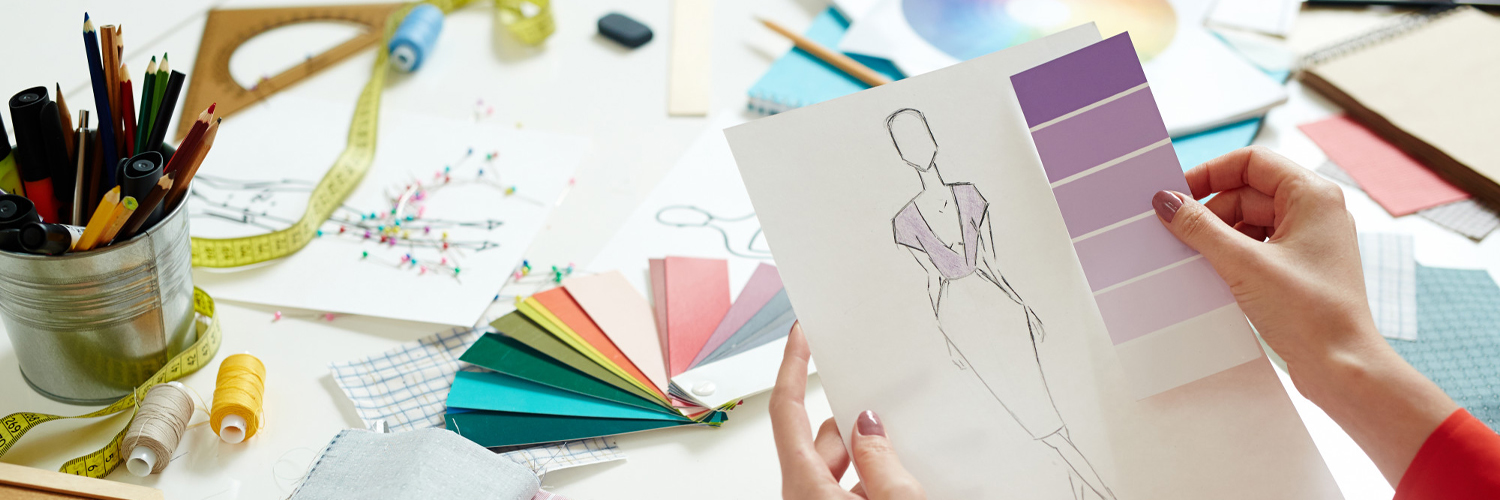Explore what a BSc in Fashion Designing can offer you.
Let us learn about the fascinating degree programme of BSc Fashion Designing and what it entails.
If you have a passion to make a career in fashion designing and wish to pursue a degree to chase it, BSc in Fashion Designing may be the right course for you. This programme enables its students to understand the various aspects of fashion design from apparel production and merchandising to fashion marketing.
BSc in Fashion and Apparel Design is a three-year undergraduate degree programme that combines the science and art of fashion and apparel design. This programme prepares students for professions in fashion design, clothing production, retail merchandising, fashion marketing, and allied sectors by fusing aesthetic creativity with technical knowledge. Acharya offers one of the best degree programmes in fashion with relevant industry exposure.
Subjects of BSc in Fashion and Apparel Design
This BSc in Fashion & Apparel Design programme covers the following subjects:
- Fabric Science And Analysis: The programme teaches the science and analysis behind identifying different fabrics and fabric structures. It also trains them in designing and drafting plans for weaves. It delves into the depths for understanding the foundations of fashion- fabrics.
- Fashion Design Principles: Students are introduced to the core ideas of fashion design, such as colour theory, pattern making, and basic sketching and rendering in both digital and traditional methods. The programme also includes teaching about national and international pioneers in fashion design. The subjects help them understand the fashion clothing categories, the design process of fashion forecasting and fashion research.
The Computer Aided Design subject helps students analyse and create technical drawings using both CAD and manual tools. It aims to train how to manipulate electronic patterns and create other styles using pattern making software. It enables students to work through the stage of the design process from motif development using Apparel Computer Aided Design software and techniques. - Fibre And Yarn Science: The BSc fashion designing syllabus includes training in the identification of different types of fibres and yarns to test their quality and understanding of the manufacturing, spinning, and processing of fibres and yarns.
- Draping: This part of the syllabus teaches the students significance of the draping technique in designing garments and the process of draping to get different silhouettes. It helps to develop various minor and major components of apparel to visualise 3D effects.
- Basics Of Garment Making & Sewing: Students learn sewing techniques, pattern drawing, and garment building methods. They develop finished clothes and prototypes as they gain experience bringing their concepts to reality.
- Historic Costumes And Traditional Textiles: This subject is included to impart knowledge on the history of textiles through the previous centuries regarding fashion clothing. It helps the learners to understand the symbolism behind various motifs, colours, and traditional textiles of India. The subject teaches about textiles around the world. The historic costumes and textiles across different ancient dynasties through time are explored in the BSc Fashion Designing subjects.
- Clothing Culture And Communication: As a fashion design student, it is important to learn the basics of clothing culture and its importance along with learning about the costume history of Western and Indian civilizations. Students understand how communication can be carried through clothing once they go through this programme. The programme aims to give an understanding of the overview of textiles of various cultures from ancient to modern day. It aims to provide insights into the different costumes of India in detail.
- Fashion Retail Marketing And Merchandising: BSc fashion designing subjects include merchandising and retail marketing to familiarise the students with the business side of the creative field of fashion design. The programme helps its students analyse the role of merchandisers, identify and evaluate the supply sources, and recognise the importance of visual merchandising. It teaches the students how to adopt different types of marketing and retailing techniques. It also teaches them about advertising, planning the display, and comparison of market values.
- Fashion Accessory: The right kind of accessory is part of the fashion ensemble that brings the whole look together. Certain accessories have historical importance and various symbolisms. They also help in enhancing and complementing fashion apparel. This fashion designing course helps students illustrate the designer’s work and creativity and materialise their vision. It also helps them apply accessory knowledge to contemporary designs. It teaches them material sourcing, the anatomy of accessories, and to design traditional accessories.
- Internship & Entrepreneurship Training: The BSc fashion designing course shall provide students with a strong basis for internship opportunities where they gain practical knowledge on different departments within the fashion industry. The course also aims to give an in-depth knowledge of textiles and handicrafts. Students shall document various Indian crafts by visiting craftsmen and artisans personally.
The students of this programme are taught to distinguish entrepreneurial qualities and adapt them. They are also taught the systematic process of selecting and screening a business idea, design strategies for successful implementation, and the importance of location and layout of the industry. These skills shall help the graduates of this programme to establish their entrepreneurial ventures.
Students also learn about the clothing psychology and role of clothing, garment detailing, garment construction, garment surface ornamentation, textile wet processing, textile apparel testing, and quality management. They are trained in preparing Fashion Portfolios, Design Collection, and Craft Documentation, to enhance their career in the fashion industry.
Career Scope
A BSc in Fashion Design opens you to a wide range of career options in the fashion sector. The scope and potential job opportunities for individuals with this degree in fashion design are as follows:
Fashion Designer: As a fashion designer, you have the option of working with well-known fashion houses, and clothing companies, or starting your own label. You will be in charge of making patterns, drawings, and designs for apparel and accessories. You can focus on particular genres like haute couture, menswear, childrenswear, sportswear, and womenswear.
Fashion Illustrators: These professionals provide illustrations of fashion designs. They frequently collaborate closely with designers to create drawings or computer-generated pictures that highlight the materials, colours, and design elements of clothing. For design presentations, fashion publications, ads, and marketing efforts, illustrations are utilised.
Fashion Stylist: Fashion stylists collect teams and develop fashion looks in collaboration with clients, companies, or media outlets. To create aesthetically appealing outfits for fashion shoots, advertising campaigns, celebrities, or personal style clients, they are in charge of choosing the right clothing, accessories, and props.
Textile Designer: Designers of textiles develop the patterns, designs, and textures used in fabrics for fashion companies. To create original and eye-catching designs, they use a variety of techniques like screen printing, digital printing, and embroidery. Textile designers frequently work at textile production companies or in collaboration with fashion designers.
Costume Designers: Costume designers create costumes for plays, movies, TV shows and other performances. They work together with producers, directors, and actors to create costumes that improve visual storytelling and capture the essence of the characters and the locales.
Fashion Buyer: Fashion buyers are in charge of choosing and acquiring clothing and accessories for retail establishments or fashion online stores. They do research on current trends, go to fashion events, and bargain with suppliers to create a product variety that fits the brand image and the target demographic.
Fashion Merchandiser: Fashion merchandisers serve as a link between purchasers and fashion designers. To determine the right product mix, price point, and distribution strategy, they examine consumer behaviour, market trends, and sales data. Fashion merchandisers make sure that the proper items are offered in retail stores or online marketplaces at the appropriate time.
Fashion Entrepreneur: You may launch your own fashion designing or related company with a BSc in fashion design. This may include setting up a boutique, a fashion design studio, a fashion advisory business, or an online fashion store.
These are but a few of the range of careers that are available for BSc in fashion design graduates. The fashion sector is huge and provides chances across a variety of industries, including fashion marketing, fashion reporting, fashion photography, fashion event management, and more. To improve your employment chances in this cutthroat business, it’s crucial to get real-world experience through internships, networking, and establishing a good portfolio. Students wanting to pursue BSc in Fashion Designing course can opt for Acharya’s programme which comes with one of the best industry exposures and practical training. Acharya is one of the best bsc fashion designing colleges in Bangalore. Our BSc in Fashion & Apparel Design degree provides thorough training and maximum exposure for an eventful career in fashion.





























